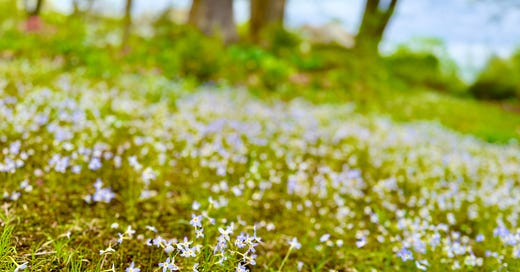“Nothing is so beautiful as Spring –
When weeds, in wheels, shoot long and lovely and lush…
The glassy peartree leaves and blooms, they brush
The descending blue; that blue is all in a rush…”
🌿 Gerard Manley Hopkins, Spring
North America’s Blue Woodland Carpet
A month ago I was following the signs at Hole Park in the woodland to search out a pool of blue among the trees. In that location, the pool was created by the British bluebell, Hyacinthoides non-scripta. Now at home again, it struck me that we have our own blue flower that creates pools for the woodland in spring. Ours may be smaller, but it is no less delightful: the diminutive bluet.
I love that the Native Plant Trust describes Houstonia caerulea as “a tiny plant with an outsized personality.”1 It was named by Linnaeus in 1753, and it is just one out of twenty-four species in the genus Houstonia.
One of its common names, Quaking Ladies, comes from the wavering motion of its flowers when they are blown by the spring breeze. The Quakers were a religious group that settled heavily in the Pennsylvania area, and they were know for “quaking” while they prayed with great emotion. This native flower is also commonly known as the azure bluet, or simply, bluet.
Join me today for a closer look at three crucial factors for ideal growing conditions for bluets (which no one else seems to mention!), and detailed photos and descriptions on how to grow your own pool of bluets…
Keep reading with a 7-day free trial
Subscribe to Julie Witmer Gardens Newsletter to keep reading this post and get 7 days of free access to the full post archives.






